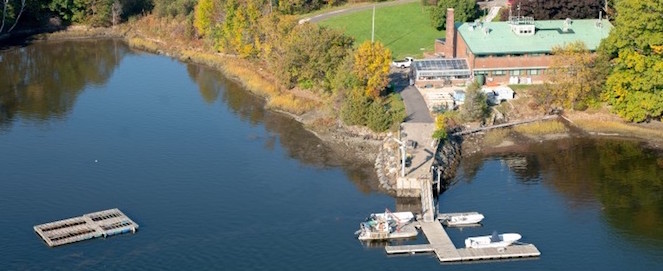
Jackson Estuarine Laboratory
The effect of causeway construction on seagrass meadows in the Western Pacific – a lesson from the ancient city of Nan Madol, Madolenihmw, Pohnpei, FSM
Abstract
Two seagrass meadow sites were chosen at Nan Madal adjacent to the now permeable remnants of an ancient causeway constructed 500 to 700 years ago: one immedlately on the shoreward side of the causeway, and one immediately on the seaward side. The shoreward site had greater seagrass cover, canopy height, algal abundance, and epiphyte abundance and lower species diversity (both seagrass and macro-algae), as well as muddier sediments than the seaward site. The abundance of associated fauna did not appear to differ between sites, although the composition of the faunal communities was different. On the seaward site, average epiphyte cover was less than onetenth the epiphyte cover of that on the shoreward side. Halimeda species were the most common algae on the seaward side, while on the shoreward side Hypnea species were dominant. Cymodocea rotundata was the dominant seagrass species (54% of seagrass cover) on the seaward site, but was absent on the shoreward site, which was dominated by Thalassia hemprichii (84%) and Enhalus acoroides (16%). There was no difference in salinity between the two sites. Sediments had a higher proportion of fine mud shoreward. The beche-de-mer, Holothuria atra, was common on the seaward side of the causeway, but not on the shoreward side. The causeway is open to water flow at all tide heights and does not appear to influence water height in any way. The effects of even this simple permeable barrier on seagrass meadows are evident and include differences in seagrass species, algal species, and fauna. We discuss the management lesson from this historic location for present-day Pacific island causeway developments.
Publication Date
1-1-2005
Journal Title
Pacific Conservation Biology
Publisher
CSIRO Publishing
Digital Object Identifier (DOI)
Document Type
Article
Recommended Citation
Coles, R., L. McKenzie, S. Campbell, R. Yoshida, A. Edward and F. Short. 2005. The effect of causeway construction on seagrass meadows in the Western Pacific – a lesson from the ancient city of Nan Madol, Madolenihmw, Pohnpei, FSM. Pacific Conservation Biology 11:212-220.
